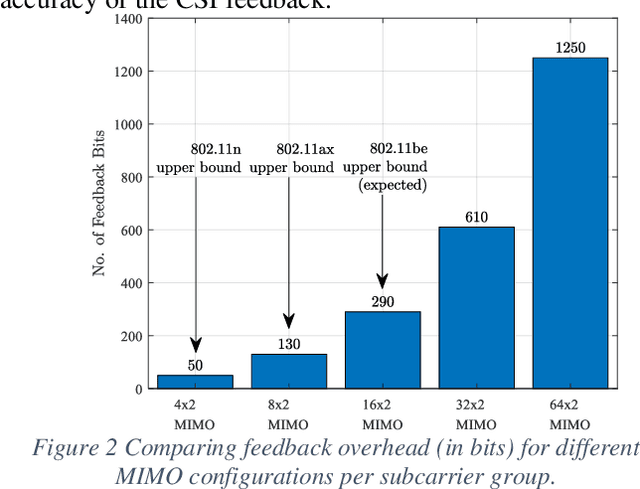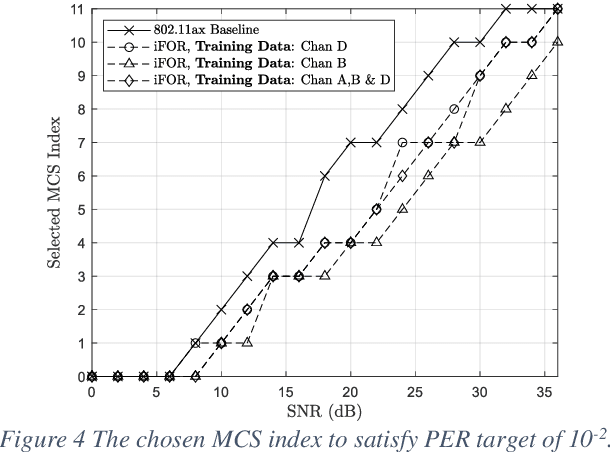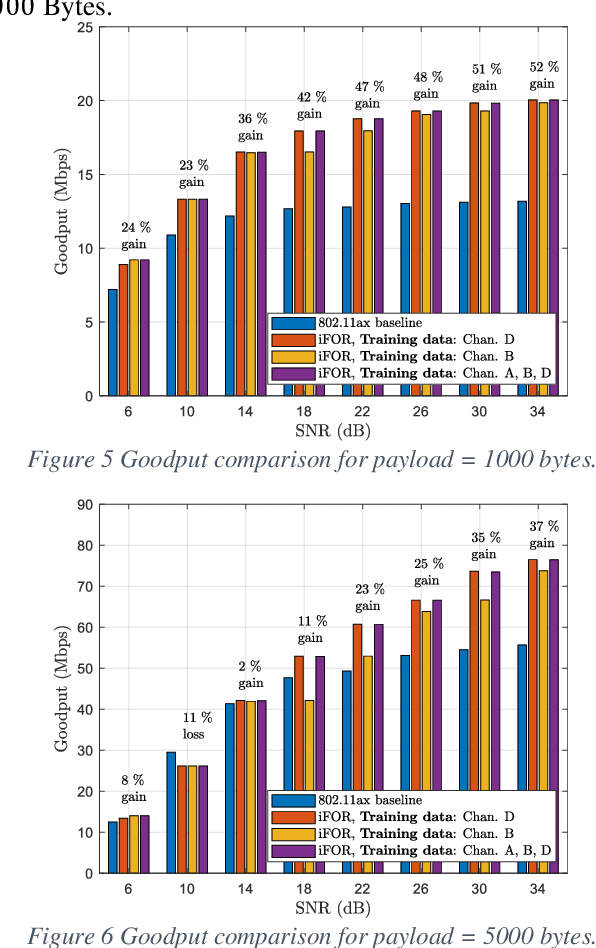Hanqing Lou
InterDigital, Inc
Enhanced Index-Based Feedback Overhead Reduction for WLANs
Dec 07, 2023



Abstract:Compressed beamforming algorithm is used in the current Wi-Fi standard to reduce the beamforming feedback overhead (BFO). However, with each new amendment of the standard the number of supported antennas in Wi-Fi devices increases, leading to increased BFO and hampering the throughput despite using compressed beamforming. In this paper, a novel index-based method is presented to reduce the BFO in Wi-Fi links. In particular, a k-means clustering-based approach is presented to generate candidate beamforming feedback matrices, thereby reducing the BFO to only the index of the said candidate matrices. With extensive simulation results, we compare the newly proposed method with the IEEE 802.11be baseline and our previously published index-based method. We show approximately 54% gain in throughput at high signal-to-noise (SNR) against the IEEE 802.11be baseline. Our comparison also shows approximately 4 dB gain compared to our previously published method at the packet-error-rate (PER) of 0.01 using MCS index 11. Additionally, we also discuss the impact of the distance metric chosen for clustering as well as candidate selection on the link performance.
An Unsupervised Machine Learning Scheme for Index-Based CSI Feedback in Wi-Fi
Dec 07, 2023Abstract:With the ever-increasing demand for high-speed wireless data transmission, beamforming techniques have been proven to be crucial in improving the data rate and the signal-to-noise ratio (SNR) at the receiver. However, they require feedback mechanisms that need an overhead of information and increase the system complexity, potentially challenging the efficiency and capacity of modern wireless networks. This paper investigates novel index-based feedback mechanisms that aim at reducing the beamforming feedback overhead in Wi-Fi links. The proposed methods mitigate the overhead by generating a set of candidate beamforming vectors using an unsupervised learning-based framework. The amount of feedback information required is thus reduced by using the index of the candidate as feedback instead of transmitting the entire beamforming matrix. We explore several methods that consider different representations of the data in the candidate set. In particular, we propose five different ways to generate and represent the candidate sets that consider the covariance matrices of the channel, serialize the feedback matrix, and account for the effective distance, among others. Additionally, we also discuss the implications of using partial information in the compressed beamforming feedback on the link performance and compare it with the newly proposed index-based methods. Extensive IEEE 802.11 standard-compliant simulation results show that the proposed methods effectively minimize the feedback overhead, enhancing the throughput while maintaining an adequate link performance.
Intelligent Feedback Overhead Reduction (iFOR) in Wi-Fi 7 and Beyond
Mar 09, 2022



Abstract:The IEEE 802.11 standard based wireless local area networks (WLANs) or Wi-Fi networks are critical to provide internet access in today's world. The increasing demand for high data rate in Wi-Fi networks has led to several advancements in the 802.11 standard. Supporting MIMO transmissions with higher number of transmit antennas operating on wider bandwidths is one of the key capabilities for reaching higher throughput. However, the increase in sounding feedback overhead due to higher number of transmit antennas may significantly curb the throughput gain. In this paper, we develop an unsupervised learning-based method to reduce the sounding duration in a Wi-Fi MIMO link. Simulation results show that our method uses approximately only 8% of the number of bits required by the existing feedback mechanism and it can boost the system throughput by up to 52%.
 Add to Chrome
Add to Chrome Add to Firefox
Add to Firefox Add to Edge
Add to Edge